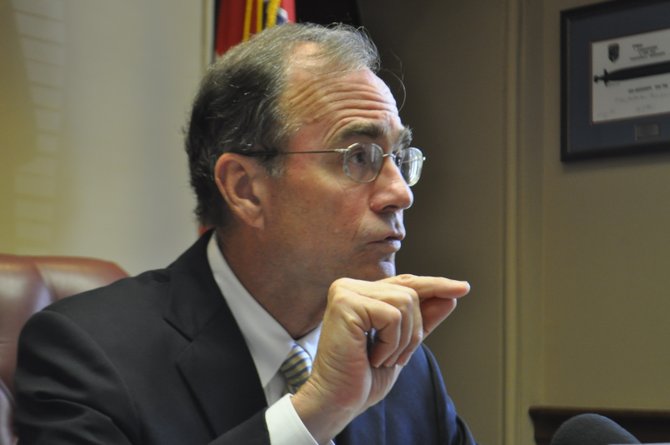Secretary of State Delbert Hosemann's election report, released Tuesday, could make it more difficult for McDaniel to prove claims he made in a lawsuit that sought to overturn his 7,667-vote loss to six-term Sen. Thad Cochran in the Republican primary runoff, if McDaniel's case ever goes to trial. Photo by Trip Burns.
JACKSON, Miss. (AP) — Fewer than 900 Mississippi voters might have cast a ballot in one party's primary June 3 and then improperly crossed over to vote in other party's runoff three weeks later, according to a new report by the state's top elections official.
That finding by Secretary of State Delbert Hosemann is significantly lower than a claim by Chris McDaniel, an unsuccessful U.S. Senate candidate who has said he thinks about 3,100 people voted in both the June 3 Democratic primary and the June 24 Republican runoff.
Mississippi does not register voters by party, but it bans people from voting in one party's primary and the other party's runoff in the same election cycle.
Hosemann's election report, released Tuesday, could make it more difficult for McDaniel to prove claims he made in a lawsuit that sought to overturn his 7,667-vote loss to six-term Sen. Thad Cochran in the Republican primary runoff, if McDaniel's case ever goes to trial.
If fewer than 900 crossover votes were tossed out, and even if they were all considered to be Cochran votes — neither of which would be guaranteed to happen — that would still not put McDaniel ahead of Cochran.
McDaniel, a tea party-backed state senator, led a three-person GOP primary June 3, but Cochran defeated McDaniel in the runoff, which had a larger turnout.
McDaniel argued in a lawsuit that crossover votes and other irregularities tainted the outcome and the results of the runoff should be tossed out. He asked a circuit judge to either declare him the nominee or order a new runoff.
Judge Hollis McGehee dismissed McDaniel's lawsuit in late August, agreeing with Cochran's attorneys, who argued McDaniel waited too long to file the suit. McDaniel's attorneys argued there was no deadline to challenge election results.
McDaniel asked the Mississippi Supreme Court to revive the lawsuit, and justices heard arguments Oct. 2. They had not handed down a ruling by Wednesday.
Hosemann's election report said 76 of Mississippi's 82 counties reported 495 people might have voted in one party's June 3 primary and the other party's June 24 runoff. It said because of the way Adams and Hinds counties conducted the elections, neither could give an accurate count of crossover voting, although Hinds officials estimated there might have been 300 to 350.
Four smaller counties — Stone, Sunflower, Tunica and Washington — estimated about a dozen crossover votes, combined. Copiah is the only county that didn't provide an estimate, Hosemann said.
The elections report also noted two outbursts by voters.
It said that on June 24 in Lafayette County, a person came to a precinct and said he or she had voted in the wrong party's runoff earlier in the day and wanted to re-do the ballot.
"When poll workers explained the voter could not now 're-do' his ballot and vote a second time, he/she threatened to return to the polling place with a gun," the report said. "Election officials and poll workers defused the situation by allowing the voter to cast an affidavit ballot, which was properly rejected, and reported the incident to the Lafayette County district attorney's office."
District Attorney Ben Creekmore could not immediately be reached Wednesday.
On June 3 in Lee County, an election observer said a voter "became outraged when asked to present photo ID," Hosemann wrote.
"The voter refused to vote by an affidavit ballot and threw a pen at one of the poll workers," the report said. "We are uncertain whether that voter returned to the polling place and eventually cast a ballot."
Copyright Associated Press. All rights reserved. This material may not be published, broadcast, rewritten, or redistributed.



Comments
Use the comment form below to begin a discussion about this content.